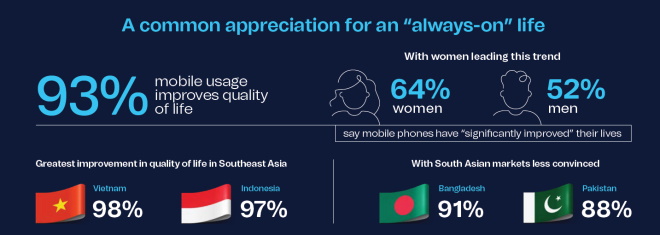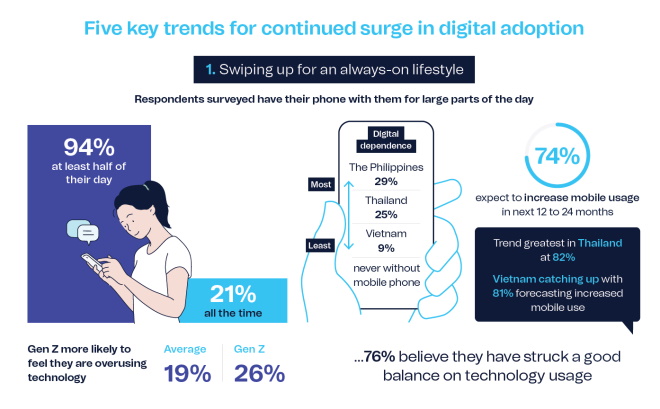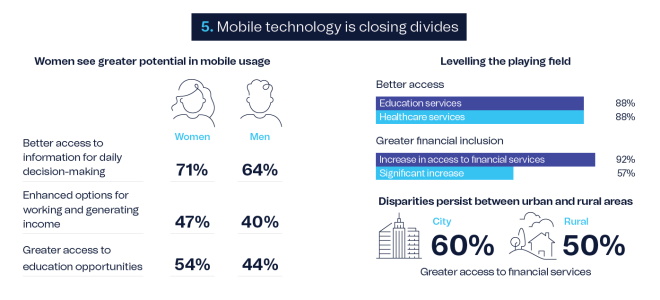
The Gen XY Lifestyle
Telenor Asia Study shows appreciation for the benefits the ‘always-on’ life
People in Asia believe that the connectivity and the ‘always-on’ life empowers them with more economic opportunity, daily convenience, and greater access to essential services
According to Telenor Asia’s Digital Lives Decoded study, respondents across Asia shared a common appreciation for the benefits of an ‘always-on’ life. Mobile connectivity has helped enrich relationships, deliver convenience and made it easier for people to participate in the digital economy.
93 percent of respondents believe that their mobile usage improves quality of life.
Women lead this trend with 64 percent saying their quality of life is significantly enhanced compared to 52 percent of men. This trend is most apparent in Thailand (76 percent) and Indonesia (74 percent), where the highest number of women are connecting to “significantly better” lives through their mobile use.
It is often reported that mobile usage comes between people, distracting users from those around them and damaging relationships and interpersonal communication skills. However, this study dispels that notion. Compared to before the pandemic, mobile data usage has more than doubled in most Asian markets, reshaping how we communicate at work and at home. Interestingly, this survey shows that people want the changes in digital use and their daily lives to stay. In fact, they continue to immerse themselves in a digital world despite rules on travel and social interaction being relaxed.
Jørgen Rostrup, Head of Telenor Asia
5 key trends in support of the ‘always-on’ life (a.k.a why there will be a continued surge in time spent on mobile devices)
Swiping up for an always-on lifestyle
Nearly all consumers surveyed have their mobile device with them for at least half of the day, and one in five are never without their phone. 76 percent of respondents feel they strike a good balance on their use of technology.

People in the Philippines and Thailand are most dependent on their mobile phones, with 29 percent and 25 percent respectively saying they are never without their mobile phones. This dependence is set to grow, with nearly three in four people (74 percent) expecting their mobile usage to increase in the coming years, a trend greatest among respondents in Thailand (82 percent).
Keeping up as digital life charges ahead
Both Gen Z and millennial respondents are more likely to feel that they are overusing technology. These two groups were also the most concerned about having the right skills to keep pace with technology. Generally, all age groups (85% of respondents) are worried that their digital skills will not keep pace with a rapidly evolving digital environment.
(Lack of) trust in the digital world
Concerns around privacy and security of mobile devices surfaced for 93 percent of respondents across the region.

Tapping into a more sustainable life
The study also reveals optimism about the potential for mobile technology to advance environmental sustainability. Three-quarters of those surveyed believe that digital access is “very important” for them to lead greener lives in the future.
Respondents cited the greatest benefits come in the areas of reducing paper, waste, and electricity (70 percent of respondents), being able to communicate more efficiently (67 percent) and providing better access to public transport with more information (55 percent). Their responses did not take into consideration that more data use will require greater energy consumption.
Mobile technology is closing the digital divide
The study also points to the greater potential women see in mobile usage, with more women than men saying mobile connectivity has enhanced their options for working and generating income and gave them better access to information and education opportunities.
Interestingly, Singapore is the only country where this trend is reversed, with more males (54 percent) than females (49 percent) finding that mobile usage improves their lives significantly.

Respondents recognise that mobile connectivity is inclusive, giving people greater access to essential services which can enrich their daily lives, such as education (88 percent) and healthcare services (88 percent).
However, it is around financial inclusion where mobile usage is really levelling the playing field. 92 percent of respondents say mobile usage has increased their access to financial services while more than half (57 percent) believe their access to financial services has “significantly improved”. There is a disparity between responses of those living in cities (60 percent) and rural areas (50 percent), perhaps shining a light on the ongoing need to broaden the reach of services to those outside urban areas.
Data and infographic credit to Telenor Asia.









